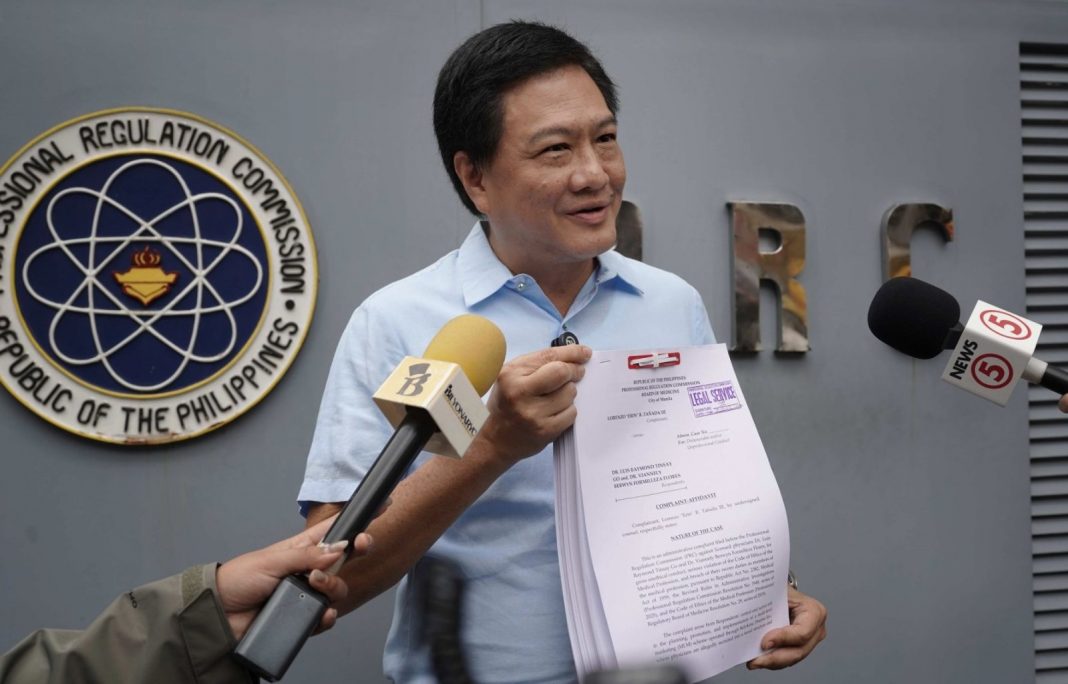Alarmed by the unethical conduct of some medical professionals who took part in a multi-level marketing (MLM) pharmaceutical scheme that preyed on the sick and the poor, lawyer and human rights advocate Lorenzo “Erin” Tañada III has filed a formal complaint before the Professional Regulation Commission (PRC) and the Board of Medicine seeking the suspension or complete revocation of the medical licenses of Dr. Luis Raymond Go and Dr. Viannely Berwyn Flores.
The complaint comes on the heels of revelations and public admissions made under oath during last year’s Senate investigation into Bell-Kenz Pharma Inc.’s MLM practices. The company, founded in 2006, was reported to have systematically recruited doctors—including those from the Philippine Heart Center in Quezon City—to prescribe its products and enlist more doctors into the scheme, turning what should have been a professional relationship into a profit-driven pyramid system.
At the heart of the complaint is the argument that Dr. Go, as Bell-Kenz Pharma’s chief executive officer (CEO) and a practicing cardiologist at the Philippine Heart Center, and Dr. Flores, as the company’s former director and also a cardiologist at the same public hospital, allegedly engaged in unethical conduct and possibly violated existing laws and medical ethical standards.
Tañada emphasized the irony and gravity of public servants victimizing patients who entrusted them with their health. “Doctors are sworn to protect life, not profit from patients by turning them into mere ‘sales targets,’” he stressed. Tañada further adds that “the issue is not about the medicine of Bell Kenz, rather, the alleged practice of doctors like Dr. Go and Dr. Flores pushing their use to patients.”
Tañada pointed out that during the Senate inquiry, no less than Dr. Go himself had admitted that about 90 percent of the medicines he prescribes come from Bell-Kenz, a possible conflict of interest, while Dr. Flores similarly admitted to prescribing mostly Bell-Kenz products and receiving dividends as an investor and director for nearly 17 years.
Both doctors, according to the Senate inquiry, purportedly used their positions at the Philippine Heart Center—a specialized public hospital meant to serve Filipinos suffering from heart ailments—to push Bell-Kenz products and recruit other doctors to the scheme, contrary to the very principles of public service and medical ethics.
Tañada likewise noted that Bell-Kenz’s scheme appears to go beyond normal marketing practices as divulged during the Senate inquiry by incentivizing doctors to buy into the company as “investors,” then earn commissions, milestone points, and luxury perks from prescribing Bell-Kenz products. Similarly as revealed during the Senate inquiry, the doctors were also encouraged to recruit more doctors, creating a “Jedi-Padawan” system mirroring classic pyramid schemes.
During the Senate investigation in April 2024, Senators Jinggoy Estrada, Raffy Tulfo, and JV Ejercito grilled Bell-Kenz top executives over the lavish perks and the company’s massive profits—reportedly rising from P1 billion in 2016 to P5 billion in 2019. Sen. Estrada revealed how entry-level investments for doctors ranged from P250,000 to P500,000, and how Bell-Kenz’s president himself conducted “nurturing lectures” to entice doctors to join the network.
The Senate probe also unearthed that Bell-Kenz doctors received up to 8% rebates on monthly sales, performance bonuses, milestone points convertible to gadgets or foreign travel, and luxury cars, with Dr. Go himself admitting to being gifted a Mercedes-Benz by Bell-Kenz’s board.
In perhaps the most damning part of the hearing, PRC Commissioner Jose Cueto Jr. confirmed that being both a doctor and investor in a pharmaceutical company creates an undeniable conflict of interest—one punishable under the Code of Ethics for the Medical Profession, which can lead to suspension or revocation of a physician’s license.
As such, Tañada underscored that Dr. Flores possibly violated the Generics Act of 1988 by prescribing medicines using brand names before generic names and in large quantities—some prescriptions running into hundreds of tablets—raising concerns of over-prescription and patient safety.
Under the Universal Healthcare (UHC) Law, the Medical Act, and the Code of Conduct for Public Officials, doctors in government hospitals like the Philippine Heart Center must uphold the highest ethical standards and avoid financial interests that could unduly influence their medical judgment.
Moreover, during the Senate inquiry, Dr. Go’s admission of ownership of a ZureRx pharmacy branch—which mostly dispenses Bell-Kenz products—adds to the conflict, as the Philippine Pharmacy Act prohibits anyone who is not a licensed pharmacist from dispensing medicines.
Tañada’s complaint also cites the fact that Bell-Kenz’s alleged scheme is akin to a Ponzi model: profits and perks for those at the top are sustained by constantly recruiting more doctors to prescribe and invest, putting the burden of these inflated costs on patients, many of whom come from low-income backgrounds.
“The poor are doubly victimized: first by the costlier branded medicines pushed by the scheme, and second by the betrayal of doctors who should have safeguarded their health,” Tañada said.
In all, among the laws possibly violated by Dr. Go and Dr. Flores, according to Tañada, are the Generics Act, the UHC Law, the Philippine Pharmacy Act, and the Financial Products and Services Consumer Protection Act, on top of blatant ethical violations.
By filing the complaint, Tañada aims to make these doctors accountable and send a strong message to the medical community: “Medicine is a profession built on trust, not commissions.”
The PRC and the Board of Medicine, under the PRC Modernization Act, are empowered to investigate, hear, and decide complaints involving unethical conduct, and if warranted, suspend or permanently revoke licenses of erring doctors.
For Tañada, this case must not end with Dr. Go and Dr. Flores alone. He called on the PRC to expand its probe into other Bell-Kenz-affiliated doctors, reportedly numbering to over 4,000 nationwide, as well as other pharmaceutical companies practicing the same business model.
“Ultimately, this is about restoring integrity to our healthcare system and ensuring that no patient is ever treated as a business opportunity again,” Tañada said.














